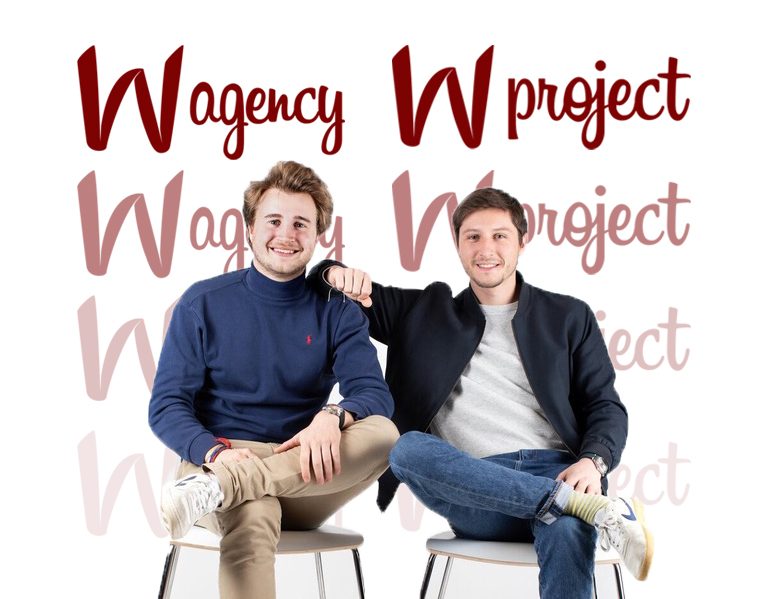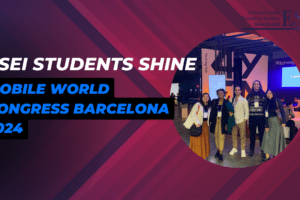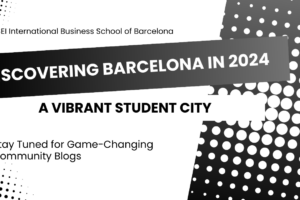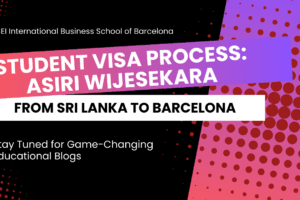
Helping companies reach their sustainability goals – interview with ESEI alumnus Santiago Torres
 W-Agency and W-Project co-founders Théodore de Ville (left) and Santiago Torres (right)
W-Agency and W-Project co-founders Théodore de Ville (left) and Santiago Torres (right)
Today, we’ve got a special success story to share with you. Santiago Torres, co-founder at W-Agency and W-Project, graduated from ESEI Master’s in Digital Entrepreneurship programme in 2017. He’s now based in Brussels, running a business that puts sustainability and innovation first. We just had to find out more!
What are W-Agency and W-Project?
W-Agency is a CSR (Corporate Social Responsibility) consulting company. They offer a wide range of solutions for companies to move towards sustainability, while turning sustainable development into a business strategy that is in line with the company’s economic interests.
W-Project, on the other hand, offers eco-conscious customers opportunities to make small sustainable changes to their lifestyle while supporting charities. For example, you can purchase donation gifts for people that allow the recipients to support a cause they care about, or buy sustainable products such as bamboo toothbrushes and metal straws.
We had a chat with Santiago about the initiatives he’s involved in. We even asked him for a few tips on what we as individuals can do to live more sustainably.
Starting a sustainability business
What inspired you to start a company that focuses on sustainability and environmental projects?
I’ve always wanted to start a meaningful business, something in the realm of social impact and innovation. However, it wouldn’t have been possible without a strong support system. Having a partner, Théodore de Ville, who helped me find this ecological and innovative concept, made all the difference.
Your company has several tiers – solidarity gifts, sustainable products and a corporate solution. Which one are you focusing on? Which one serves as the core of your business?
We set off with the donation gifts idea. Then, we diversified our range of sustainable products as a part of the W-Project initiative. Finally, we created W-agency, which is currently the main financial source and takes up 90% of our time. We have disassociated our B2B project from the B2C one in order to better focus on the companies interested in our corporate solutions.
How do you choose the projects that you donate to? And how do you make sure that your donation goes to the right places?
We choose projects that respect our three key principles: solidarity, action and transparency.
Selected associations also need to meet our six criteria:
- Concrete actions: All projects must have a concrete, quantifiable impact.
- Legitimacy: The selected associations must be experts in their field and their legitimacy must be recognised by reputable organisations.
- Follow-up: The associations must be able to inform us about their progress.
- Financial clarity: The associations must share with us their financial results and how their resources are being allocated.
- Non-political: Only humanitarian and non-profit organisations with no political commitments are accepted.
- W-factor: The W-Project team has the right to ultimately decide which organisations to work with.
The causes we support fall into the categories of environmental protection, human rights, education, animal protection and health.
When we find a project that we like, we dig for information, contact the association and, if possible, we set up an in-person meeting. However, we avoid long-distance travel in order to reduce our carbon footprint.
Helping companies go green
How do you help companies be more sustainable?
In order to facilitate a company’s ecological transition, we have developed a six-step solution:
- Workshops: Familiarising teams with CSR and sustainability practices through training.
- CO2 impact: Calculating and offsetting CO2 emissions.
- Philanthropy: Supporting charity organisations through donations.
- Corporate culture: Encouraging participatory innovation through team building, volunteering, suggestion boxes, etc.
- Ecological alternatives: Finding the ideal partners for making sustainable changes in office supplies, packaging, etc.
- The W-platform: A toolbox for companies to manage and enhance their CSR commitments.
What does your process look like?
First, we evaluate the company’s CSR maturity level. It’s essential that companies become aware of their current CSR state, identifying challenges and opportunities.
Next, we come up with concrete action steps depending on where the company is on its green journey. There’s no one-size-fits-all solution, it all depends on the initial diagnosis.
Finally, we announce the company’s commitment to sustainable development. We create communication campaigns to promote the company’s CSR initiatives to employees and customers and give visibility to results.
Our role in saving the planet
What are some of the things that we as individuals can start doing right now to live more sustainably?
I’d say that people should reflect on their own consumption habits. This is the very first step to living more sustainably. It is not only about choosing ecological products, but mainly about reducing consumerism. Thus, questioning what is really necessary in our daily lives and acting upon it can make a real difference.
At W-project, we believe that every small action has an impact. We encourage people to consume less and find the best alternatives to be more environmentally conscious in their own lifestyles.
If you could do one thing to help save the planet and its people, what would it be (if time and money were not an issue)?
I would work with the five biggest companies in the world through W-Agency in order to neutralise all of their CO2 production. This would have a massive impact on climate change.
Choosing the right course to support your career goals
Why did you choose the digital entrepreneurship course at ESEI?
I come from a family of entrepreneurs, which hugely influenced my decision to pursue a career in business and innovation. So, it was clear to me that choosing ESEI would open the door to new technologies and great possibilities in the entrepreneurial world.
How did your studies at ESEI help you with starting your own business?
Being plunged into a favourable environment helped me create a solid network of partners who shared the same goals as me. Moreover, I had inspiring professors who encouraged me to put my ideas into practice as soon as possible. Next to all this, my thesis at the end of the course was a good exercise to finish my Master’s and prepare for starting my own business.
Would you recommend ESEI to other students?
Yes, I would recommend ESEI to anyone interested in entrepreneurship, especially the Master’s in Digital Entrepreneurship programme.
If Santiago’s story has inspired you and you’re interested in becoming an entrepreneur, check out our Master’s in Digital Entrepreneurship course!
Tag:entrepreneurship



